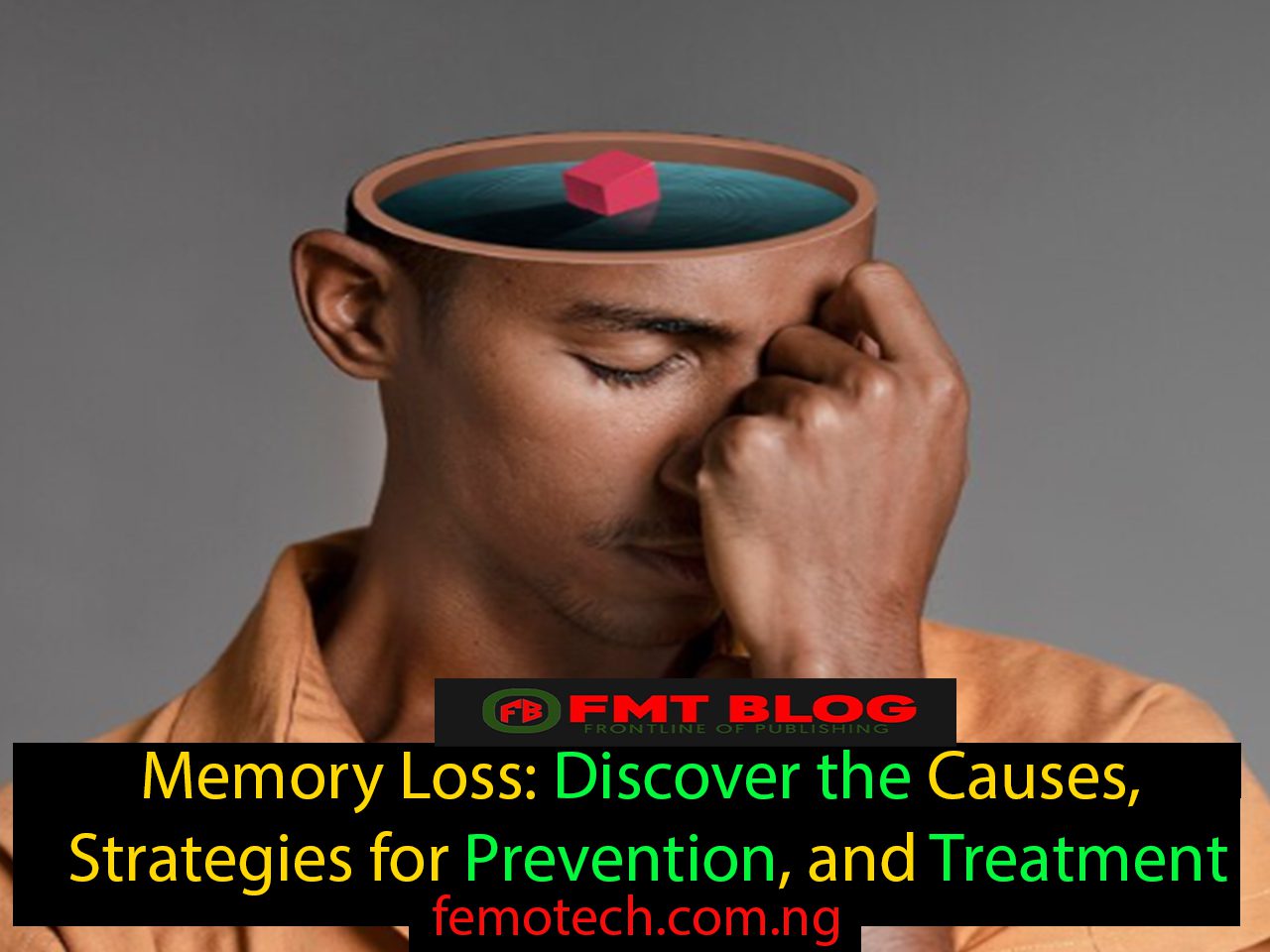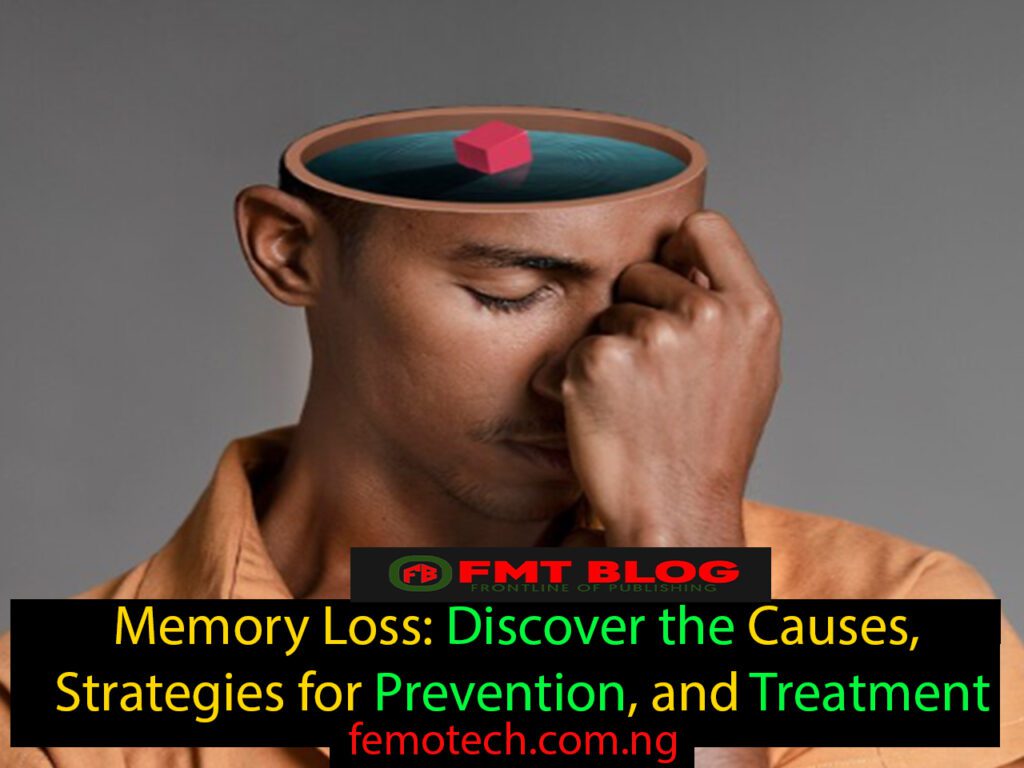
Fight Back Against Memory Loss, Discover the Symptoms, Causes, Medications and Therapies to Regain Control and Sharpen Your Mind!

Introduction
Memory loss can be a scary topic, especially as we get older. It’s that feeling when you can’t quite remember something you just learned, or you walk into a room and forget why you went in there in the first place. Memory loss simply means having trouble remembering things. It’s forgetting information that you learned or experienced at some point in the past. While forgetting things occasionally happens to all of us, memory loss that happens more and more often can be a cause for concern.
But before we look into the causes of memory loss, it will be great if we first look into the types of memory loss. When we understand the different types of memory loss, we can know when something might be wrong and what might be causing it, which can help you take charge of your brain health and memory as you age.
Short-Term and Long-Term Memory Loss
Short-Term Memory
To make this explanation very simple and easy for everyone, I decided to use a simple illustration. Let’s take the brain as a giant filing cabinet with two main sections for storing information. The first section, called short-term memory, is like a temporary desk where you can hold onto things for a short while. This is useful for everyday tasks, like remembering a phone number long enough to dial it or following a simple instruction given by your friend.
For instance, if you’re looking up a phone number on your phone, the number appears on the screen for a few seconds, which is plenty of time for you to use your short-term memory to copy it and dial. But if you get distracted and forget to dial the number right away, it might disappear from your short-term memory like a note scribbled on a napkin that you accidentally threw away.
Long-Term Memory
Earlier, I said we should consider the brain to be like a giant filing cabinet with two main sections. The other section of your brain’s filing cabinet is long-term memory. This is where information gets stored for a much longer time—sometimes even a lifetime! This is where you keep important things like memories of your birthday party as a child, historical facts you learned in school, or the skills you need to ride a bike. Going back to our filing cabinet analogy, long-term memory is like a filing cabinet with folders and labels, where you can easily organize and retrieve information whenever you need it.
Symptoms of Memory Loss
Now that we have a better understanding of what memory loss is and the difference between short- and long-term memory, let’s look at the symptoms of memory loss:
Short-Term Memory Loss:
- Frequently forgetting recently learned information
- Difficulty following multi-step instructions
- Misplacing everyday objects
- Difficulty remembering appointments or conversations
Long-Term Memory Loss:
- Difficulty recalling events from the past (personal or historical)
- Difficulty recognizing familiar people or places
- Forgetting important personal information (birthdays, addresses)
- Difficulty learning new information or skills
Causes of Memory Loss
Short-Term Memory Loss
Age: As we get older, it’s perfectly normal for our ability to hold onto information in our short-term memory to weaken a bit. It’s like having a smaller desk to work on, so you can’t juggle quite as many things at once. The good news is that this kind of age-related memory decline shouldn’t be so severe that it disrupts your daily life. For example, forgetting where you put your keys down every now and then is pretty common.
But if you’re starting to forget important things like appointments or medications, or if you’re having trouble following conversations, that’s a sign that it might be a good idea to talk to your doctor. When we’re feeling stressed or anxious, it can be hard to focus on anything, let alone remember new things. Imagine you’re trying to have a conversation with a friend while you’re worried about a big presentation you have to give at work the next day.
It’s likely that some of the things your friend says will go in one ear and out the other because your brain is busy trying to deal with all that stress. The same thing happens when we’re feeling anxious. Our brains are so preoccupied with worry that we have trouble holding onto new information.
Lack of sleep: Just like our bodies need rest to recharge, our brains need sleep to solidify memories. When we don’t get enough sleep, our brains don’t have enough time to process and store new information in long-term memory. It’s like trying to pack away your groceries without unpacking the boxes from your last shopping trip—things get cluttered and confusing! Aim for 7-8 hours of quality sleep each night to give your brain the rest it needs to function at its best.
Medications: Certain medications can have side effects that impact memory. Always discuss potential side effects with your doctor.
Dehydration: Mild dehydration can affect cognitive function, including memory.
Long-Term Memory Loss
Neurodegenerative diseases: Alzheimer’s disease and dementia are progressive conditions that cause significant memory loss and cognitive decline.
Head injury: A concussion or other head injury can damage brain cells and lead to memory problems.
Stroke: A stroke can disrupt blood flow to the brain, potentially causing memory loss, depending on the affected area.
Vitamin deficiencies: Vitamin B12 deficiency can contribute to memory problems.
Mental health conditions: Depression and anxiety can sometimes manifest as memory difficulties.
Preventing Memory Loss
While some forms of memory loss are inevitable as we age, there are steps you can take to promote brain health and potentially slow down cognitive decline:
Maintain a healthy lifestyle. This includes a balanced diet, regular exercise, and adequate sleep.
Engage in mentally stimulating activities: Challenge your brain with puzzles, games, learning a new language, or creative pursuits.
Manage stress effectively: Practice relaxation techniques like meditation or yoga.
Maintain strong social connections: Regular interaction with friends and family can stimulate your brain and provide emotional support.
Treatment
Just like a doctor wouldn’t give the same medicine for a tummy ache and a broken arm, the treatment for memory loss depends on what’s causing it. If forgetting things is happening because you’re stressed or not sleeping well, the treatment will be different than if it’s caused by a disease.
Here’s a breakdown of treatment options based on different causes:
Lifestyle Changes: If forgetting things is happening because of things you can control, like stress, not getting enough sleep, or not eating the right foods, there’s good news! Making healthy changes to your daily routine can make a big difference in your memory. Getting enough good sleep each night, finding healthy ways to manage stress, and eating plenty of fruits, vegetables, and fish can all help your brain work better. In some cases, these simple changes can even help you remember things more easily.
Medication: Some medicines, like those used for feeling down or anxious, can sometimes make it harder to remember things. If your doctor thinks this might be happening, they may adjust your medications or recommend other treatments. For memory loss linked to conditions like low thyroid hormone or a lack of vitamin B12, there are medications that can fix the problem and possibly improve your memory. There are also some medicines that can help a little bit with memory problems in Alzheimer’s disease and other forms of dementia. These medicines work by either slowing down the disease or helping brain cells talk to each other better.
Cognitive Rehabilitation: This therapy program helps individuals with memory loss develop strategies to compensate for cognitive challenges. By working with a therapist, you can learn memory-boosting techniques like organization tools, mnemonic devices, and visualization exercises. Cognitive rehabilitation can empower you to adapt to memory loss and maintain independence in your daily life.
Neurodegenerative Disease Management: There is no magic cure for diseases like Alzheimer’s or Parkinson’s, which can cause memory loss to slowly get worse over time. However, there are treatments that can help manage the symptoms, slow down the disease, and make life better for people with these conditions. These treatments may include medications, special therapy to help with memory and thinking skills, and support groups where people with similar problems can connect and share experiences.
The Importance of Early Diagnosis
The sooner you catch memory loss, the better. If you’re forgetting things more than usual and it’s causing problems in your daily life, see your doctor. They can figure out what’s going on and recommend the best treatment to help you keep your memory sharp for as long as possible.
Follow us on socials → Telegram | X/Twitter | Facebook | WhatsApp |WhatsApp Channel |Mobile App
Conclusion
Memory loss is a complex issue with many potential causes, but understanding the different types of memory loss and their symptoms can empower you to take proactive steps towards prevention and early diagnosis. Don’t let memory loss hold you back from enjoying life to the fullest! By prioritizing your brain health and seeking professional help if necessary, you can navigate the challenges of memory loss and continue living a fulfilling life. Early intervention can be key to maintaining cognitive function and ensuring optimal brain health throughout your life.



